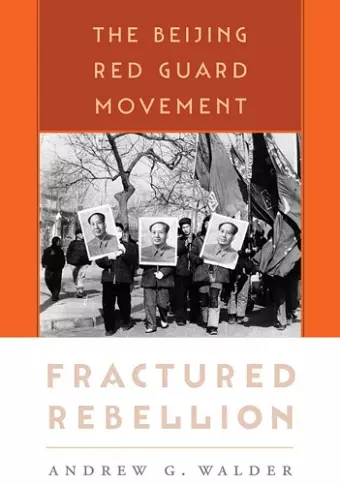Fractured Rebellion
The Beijing Red Guard Movement
Format:Paperback
Publisher:Harvard University Press
Published:4th Apr '12
Currently unavailable, and unfortunately no date known when it will be back

An impressive and important work of scholarship which will join a small set of major books on the Cultural Revolution. -- Jeffrey N. Wasserstrom, University of California, Irvine An analysis that will alter the view of one of the seminal events in the history of the People's Republic of China. -- Frederick C. Teiwes, the University of Sydney A truly extraordinary scholarly achievement. Never has the immensely important puzzle of the Red Guard Movement ever been rendered in such rich, clarifying empirical detail as Walder gives us here. -- Doug McAdam, Stanford University Better than anything else I have read, Andrew Walder's Fractured Rebellion explains how and why the Beijing students in the first two years of the Cultural Revolution became so sharply, bitterly, and fatally divided. An absorbing work of research and synthesis. -- Jonathan Spence, author of The Search for a Modern China
This book is the first full-length account of the evolution of China’s Red Guard Movement in Beijing from its beginnings in 1966 to its forcible suppression in 1968. Walder combines historical narrative with sociological analysis to explore the radical student movement’s crippling factionalism, devastating social impact, and ultimate failure.
Fractured Rebellion is the first full-length account of the evolution of China’s Red Guard Movement in Beijing, the nation’s capital, from its beginnings in 1966 to its forcible suppression in 1968. Andrew Walder combines historical narrative with sociological analysis as he explores the radical student movement’s crippling factionalism, devastating social impact, and ultimate failure.
Most accounts of the movement have portrayed a struggle among Red Guards as a social conflict that pitted privileged “conservative” students against socially marginalized “radicals” who sought to change an oppressive social and political system. Walder employs newly available documentary evidence and the recent memoirs of former Red Guard leaders and members to demonstrate that on both sides of the bitter conflict were students from comparable socioeconomic backgrounds, who shared similar—largely defensive—motivations. The intensity of the conflict and the depth of the divisions were an expression of authoritarian political structures that continued to exert an irresistible pull on student motives and actions, even in the midst of their rebellion.
Walder’s nuanced account challenges the main themes of an entire generation of scholarship about the social conflicts of China’s Cultural Revolution, shedding light on the most tragic and poorly understood period of recent Chinese history.
An impressive and important work of scholarship which will join a small set of major books on the Cultural Revolution. -- Jeffrey N. Wasserstrom, University of California, Irvine
An analysis that will alter the view of one of the seminal events in the history of the People's Republic of China. -- Frederick C. Teiwes, the University of Sydney
A truly extraordinary scholarly achievement. Never has the immensely important puzzle of the Red Guard Movement ever been rendered in such rich, clarifying empirical detail as Walder gives us here. -- Doug McAdam, Stanford University
Better than anything else I have read, Andrew Walder's Fractured Rebellion explains how and why the Beijing students in the first two years of the Cultural Revolution became so sharply, bitterly, and fatally divided. An absorbing work of research and synthesis. -- Jonathan Spence, author of The Search for a Modern China
The book masterfully combines historical case studies with sociological methodology and fundamentally changes our understanding of Red Guard factionalism...The book is without doubt one of the greatest breakthroughs in research on the Cultural Revolution published during the past three decades and should be read by anyone interested in the history of mass movements and modern Chinese history in general. -- Daniel Leese * China Quarterly *
Too little research has been conducted about the fascinating, confusing upheavals that shook China during the Great Proletarian Cultural Revolution of 1966–68. Now, four decades after the mass fighting was suppressed, Andrew Walder helps to fill important gaps in our knowledge...Fractured Rebellion: The Beijing Red Guard Movement makes an important contribution to our knowledge of an extraordinary, tumultuous period in recent Chinese history. -- Jonathan Unger * China Journal *
While not minimizing either the violence or Mao's responsibility, Walder presents a less stereotyped and more diverse picture of Red Guard attitudes to violence--as far as I know for the first time at this length in Western scholarship. -- John Gittings * The China Beat *
Revealing...Walder's book, the first on the Beijing Red Guards, concentrates entirely on the movement in the capital's universities and schools and the conflicts among them, mighty subjects in themselves. -- Jonathan Mirsky * New York Review of Books *
Walder's volume is a remarkable piece of scholarship of intellectual honesty and rigor...It is precisely because Walder consistently refuses to simplify that his powerful account of Beijing's Red Guard movement captures its unpredictability, its volatility, and, above all, its internal complexity...Walder's fine contribution pushes us to reevaluate what we thought we knew about this pivotal period in modern Chinese history and, perhaps, to reflect again on the scope and breadth of its lingering irresolution. -- Patricia Thornton * Journal of Asian Studies *
- Nominated for Gregory Luebbert Best Book Award 2011
- Nominated for Woodrow Wilson Foundation Award 2011
- Nominated for J. David Greenstone Book Prize 2011
- Nominated for Joseph Levenson Book Prize 2011
ISBN: 9780674064133
Dimensions: unknown
Weight: unknown
416 pages